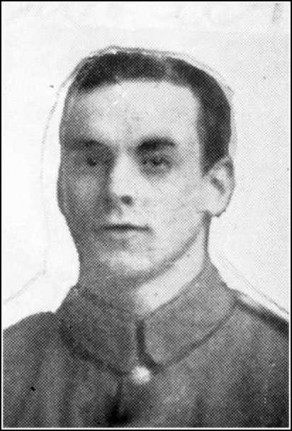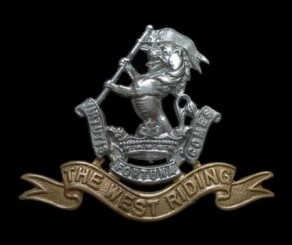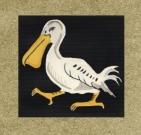
24 December 1915
KILDWICK – KILDWICK BAND’S DEPLETED MEMBERSHIP
During the war the membership of the Kildwick and District Prize Band has suffered very much in number and now, under Lord Derby’s scheme, another batch has been attested, and will be called up in their class. Despite the fact that the membership of the band has been reduced, the committee has decided to continue the custom of playing during Christmas and the New Year. The members who have joined the Colours are:– Messrs. J. Smith (killed), G. Inskip, C. Lee, J. Wellock, J. Tatcham, H. Riddiough, F. Drive (discharged), Harry Pollard and W. Ward. Attested: Messrs. W. Hopkinson, H. Walmsley, H. Barker, M. Dawson, R. Knight. Rejected: Messrs. J.W. Hartley, H. Heaton, S. Lister.
21 July 1916
CRAVEN CASUALTIES IN THE GREAT ADVANCE – Farnhill’s Wounded Soldier
Mr. Richard Inskip, of Mary Street, Farnhill, has received official notification regarding his second son, Private Richard Inskip, of the 9th Duke of Wellington’s, informing him that he is suffering from a gunshot wound in the foot, and is now in hospital in Cheshire. Private Inskip joined the forces in August 1915, and went out to France about five weeks ago. Mr. Inskip’s eldest son, Private George Inskip, is also in the Duke of Wellington’s, having joined in September 1914. He was a member of the Kildwick and District Prize Band and is now in the band belonging to his regiment.
30 November 1917
FARNHILL
SOLDIER WOUNDED – Mr. Richard Inskip, of Hanover Street, Farnhill, has received word that his second son, Richard, has been wounded in the right hand during the recent engagement in France. Pte. Rd. Inskip is in the Duke of Wellington’s Regiment, and bas been wounded twice previously. He is now at a base hospital, and expects to be sent to England shortly. His brother George is also in the same regiment, but did not take part in the engagement, as he was on duty with his officer at a hospital. Before enlisting, Pte. Rd. Inskip was employed by Messrs. John Woodrow and Son.
21 December 1917
INSKIP – Killed in action, Nov. 27th, Pte. George Inskip, of the Duke of Wellington’s West Riding Regiment, eldest son of Mr. Richard Inskip, of Hanover Street, Farnhill.
21 December 1917
FARNHILL
SOLDIER KILLED
Mr. Richard Inskip, of Hanover Street, Farnhill, received the sad news on Wednesday that his eldest son, Pte. George Inskip (Duke of Wellington’s West Riding Regiment) had been killed in action. The letter is from 2nd Lieut. E. R. Storey, and reads as follows:– “It is with great sorrow that I have to inform you that your son was killed in action on Nov. 27th last. It may be some small consolation to you to know that he died instantly, and therefore suffered no pain. He was well liked by his comrades in the company, and his death is a loss to us all. All the officers and the men of the ‘B’ Company send their warmest and deepest sympathy to you in your most sad bereavement.” Before enlisting, deceased was employed by Messrs. T. and M. Bairstow, Sutton Mills. He joined the West Riding Regiment in September, 1914, and served with the band at Skipton. Later he trained at Doncaster and Derby, and proceeded to France in February, 1917. Mr. Inskip’s second son, Richard, was in the same battalion as his brother, and is now in hospital at Reading suffering from wounds in his left hand. A third son, Louis, has been rejected from military service. Pte. George Inskip was formerly a member of Kildwick Brass Band, playing the cornet.
15 February 1918
CROSSHILLS
MEMORIAL SERVICE – On Sunday evening last a memorial service was conducted in the Wesleyan Church by Rev. Thomas Dargue (superintendent minister). Special hymns were sung, and the anthem ‘What are these?’ was given by the choir, under the leadership of Miss Thornton, of Sutton. The opening hymn was ‘Give me the wings of faith to rise.’ Prior to the sermon, Mr. Dargue referred to the trials of life which came to the human family, but that which struck hardest, he remarked, was that which took men from their homes and family. Four young men who had gone through their Sunday-school had passed from them. Private Benjamin Freeman, of the Canadian Regiment, was killed on November 5th; Private G. Inskip, of the Duke of Wellington’s Regiment, was killed on November 27th; Private Arthur Happs, of the Durham Light Infantry, had been missing since April 21st, all hope of his being alive has gone. Private Percy Happs, of the Duke of Wellington’s Regiment, who had been missing since the 26th of April, only four days after his brother, and of whom special enquiries had been made through their chief chaplain, who gave little hope of his being taken prisoner, and the fears entertained of his death were probably true. He offered his sympathy and hoped that consolation might be found in knowing that they died bravely for the good of the world. Mr. Dargue also referred to the good characters of the deceased, and expressed the sympathy of the church with the parents and those who had suffered loss in the passing of these four young men. Mr. Dargue’s discourse was based upon the words taken from the 21st chapter of Revelation, 23rd verse, “And the lamb is the light thereof.” Often, he remarked, he had asked why the innocent suffered with the guilty, and why did not something happen to the men who had brought this calamity upon them, which had been the cause of so many lives being lost? In the city where our loved ones in Christ had gone, the mystery was made clear and straight, for the city was God illuminated. He was the light, and the light gave full knowledge to those who had passed into the homeland. The service closed with the hymn ‘For ever with the Lord.’









No comments yet.